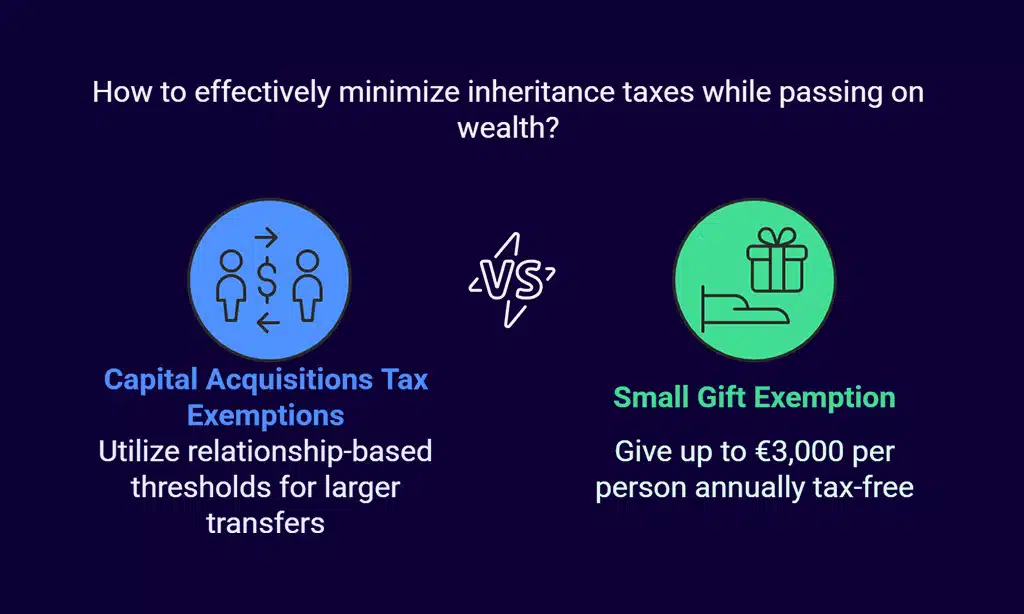Retirement should be a time to enjoy life, travel, and spend quality time with loved ones. However, without strategic planning, taxes can significantly reduce your retirement income.
Thankfully, there are numerous tax-saving tips for retirees in Ireland that can help minimize your tax burden and maximize savings.
In this guide, we will explore essential tax-saving strategies, reliefs, exemptions, and incentives that can help you keep more of your hard-earned money.
Whether you’re planning for retirement or already enjoying your golden years, these insights will equip you with the knowledge needed to optimize your financial future.
Understanding Taxation for Retirees in Ireland
Before diving into specific tax-saving strategies, it is important to understand how taxation works for retirees in Ireland.
How Are Pensions Taxed?
- State pensions and private pensions are subject to income tax, Universal Social Charge (USC), and Pay Related Social Insurance (PRSI) (in certain cases).
- The standard income tax rates in Ireland:
- 20% for income up to €42,000 (for married couples, it’s higher)
- 40% for income above this threshold
- USC Rates for Pensioners:
- 0.5% on income up to €12,012
- 2% on income between €12,013 and €25,760
- 4.5% on income between €25,761 and €70,044
- 8% on income above €70,044
- PRSI is not applicable for retirees aged 66 and over.
By understanding these tax rules, retirees can better plan their financial strategies and apply for reliefs and exemptions where applicable.
Top 10 Tax-Saving Tips for Retirees in Ireland
Navigating taxes in retirement can be challenging, but with the right strategies, retirees in Ireland can significantly reduce their tax burden. Understanding the available reliefs and exemptions can help ensure you make the most of your hard-earned savings.
Here, we explore the best tax-saving tips for retirees in Ireland to help you maximize your retirement income.
1. Claim Age-Related Tax Credits
One of the easiest ways for retirees to save on taxes in Ireland is by claiming age-related tax credits. If you are aged 65 or older, you qualify for higher income exemption limits and additional tax benefits. These credits reduce your overall tax liability, ensuring that you keep more of your retirement income.
| Age Group | Single Income Exemption | Married Income Exemption |
| 65+ | €18,000 | €36,000 |
If your income slightly exceeds these limits, you may qualify for marginal relief, which means you will only be taxed on the excess income over the exemption limit.
2. Maximize the Married Person’s Tax Credit
Retired couples can benefit greatly from the Married Person’s Tax Credit, which can significantly reduce their tax liability. By opting for joint assessment, couples can take advantage of higher income tax bands and enjoy a more favorable tax rate.
| Assessment Type | Tax Band for 20% Rate |
| Single | €42,000 |
| Married | €84,000 |
Joint assessment can also allow a spouse with a lower income to transfer unused tax credits to their partner, maximizing tax savings.
3. Take Advantage of the Age Exemption Limit
Retirees aged 65 and above are entitled to an income exemption limit, meaning they pay no tax if their total income falls below a certain threshold. This exemption ensures that those with modest retirement incomes can retain more of their money for living expenses without the burden of taxation. The threshold applies to both single and married retirees, with different limits based on marital status. If income slightly exceeds the threshold, marginal relief may apply, ensuring that only the excess portion is taxed rather than the full income.
| Income Level | Tax Liability |
| Below €18,000 (single) | No tax owed |
| Below €36,000 (married) | No tax owed |
| Above limit | Tax applies on excess income |
If your income slightly exceeds this limit, marginal relief can apply, ensuring that tax is only paid on the portion above the exemption threshold.
4. Use the Home Carer Tax Credit
If one spouse is a stay-at-home carer while the other earns an income, the couple may qualify for the Home Carer Tax Credit, reducing their tax bill. This credit is particularly beneficial for families where one spouse takes care of dependent children, elderly relatives, or individuals with disabilities.
By claiming this tax credit, the working spouse can lower their overall tax liability, helping to ease financial pressure on the household. To qualify, the carer’s annual income must be below a certain threshold, and partial relief is available for those earning slightly above the limit.
Eligibility Criteria:
- The home carer must earn less than €10,000 annually to receive the full credit of €1,800.
- A partial credit applies for incomes between €10,000 and €16,500.
5. Optimize Pension Contributions for Tax Relief
Making additional voluntary pension contributions (AVCs) can reduce taxable income and increase retirement savings. These contributions allow retirees to maximize their pension funds while benefiting from significant tax relief. Pension contributions qualify for tax relief at your highest tax rate, meaning every €1,000 contributed could save up to €400 in tax.
Additionally, contributions made before the October 31st deadline can be backdated to the previous tax year, offering further tax planning flexibility. By consistently contributing to a pension, retirees can ensure financial stability and long-term security while optimizing their tax efficiency.
| Contribution Amount | Tax Relief at 40% |
| €5,000 | €2,000 tax relief |
| €10,000 | €4,000 tax relief |
6. Benefit from Medical Expense Deductions
Retirees can claim tax relief on medical expenses, including GP visits, specialist treatments, prescriptions, and more. This tax relief is granted at 20%, allowing retirees to offset some of their healthcare costs and reduce overall tax liability. Covered expenses also include dental treatments, physiotherapy, diagnostic procedures, and even certain home nursing services.
To claim this relief, retirees must keep detailed receipts and submit claims through the Revenue Online Service (ROS). With rising healthcare costs, taking advantage of this tax relief can lead to substantial financial benefits over time, ensuring access to necessary medical care without excessive financial strain.
| Medical Expense | Tax Relief |
| €1,000 | €200 |
| €5,000 | €1,000 |
7. Explore Inheritance and Gift Tax Exemptions
Retirees who wish to pass on wealth can take advantage of Capital Acquisitions Tax (CAT) exemptions to minimize taxes. The Irish tax system allows for tax-free transfers of wealth up to specific thresholds, depending on the relationship between the donor and recipient. Parents can pass on up to €335,000 to a child without any tax liability, while smaller allowances apply to grandchildren, siblings, and others.
Additionally, the Small Gift Exemption permits individuals to give up to €3,000 per recipient annually tax-free, making it a useful strategy for gradually passing on wealth without incurring tax penalties. Strategic estate planning and the use of trusts can also help retirees reduce inheritance tax burdens for their beneficiaries.
| Beneficiary Type | Tax-Free Threshold |
| Child | €335,000 |
| Grandchild | €32,500 |
| Others | €16,250 |
Using the Small Gift Exemption, retirees can also gift €3,000 per person annually tax-free.
8. Utilize Rental Income Tax Reliefs
Retirees earning rental income can deduct expenses such as property repairs, insurance, and management fees to lower taxable income. These deductible expenses help reduce the taxable portion of rental income, ensuring retirees do not overpay in taxes.
Additional deductions include mortgage interest, property depreciation, utility costs (if covered by the landlord), and legal fees associated with leasing agreements. Taking full advantage of these deductions can lead to substantial tax savings and increase the profitability of rental properties in retirement.
| Taxable Rental Income | Tax Owed (40% rate) |
| €20,000 | €8,000 |
| After Deducting €5,000 Expenses | €6,000 tax owed |
9. Claim Tax Relief on Home Renovations (HRI Scheme)
Under the Home Renovation Incentive (HRI), retirees can claim a 13.5% tax credit on renovation expenses between €4,405 and €30,000. This scheme allows retirees to offset some of the costs associated with improving their homes, making it an excellent way to enhance living conditions while benefiting from tax relief.
Eligible renovations include structural improvements, energy-efficient upgrades, and necessary repairs. To qualify, the work must be carried out by a tax-compliant contractor, and claims must be submitted through the Revenue Online Service (ROS).
10. Plan for Capital Gains Tax (CGT) Exemptions
Selling assets can trigger Capital Gains Tax (CGT) at 33%, but certain reliefs can help retirees reduce their tax liability. If you are selling your primary residence, you may qualify for Principal Private Residence Relief, which exempts the gain from CGT.
Additionally, Retirement Relief can apply if you are aged 55 or older and selling a business, potentially allowing you to avoid CGT entirely up to a certain threshold. Entrepreneurs selling businesses may also benefit from Entrepreneur Relief, reducing CGT to 10% on qualifying gains up to €1 million. Proper planning and understanding these exemptions can significantly lower your tax burden.
| Relief Type | Benefit |
| Principal Private Residence | No CGT on home sale |
| Retirement Relief | Full CGT exemption for business sale (age 55+) |
Wrap Up
By implementing these tax-saving tips for retirees in Ireland, you can legally minimize taxes and maximize your retirement income. Take advantage of available credits, reliefs, and exemptions to make your golden years financially stress-free. For personalized advice, consult a tax professional or visit the Revenue website for up-to-date tax regulations.
Start planning today and keep more of your hard-earned retirement savings!






































